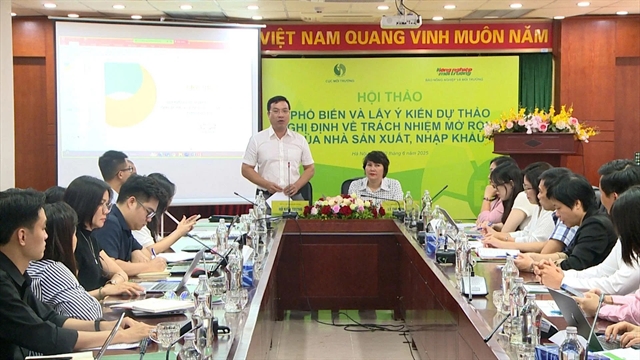The event attracted nearly 100 delegates representing regulatory agencies, associations, enterprises, manufacturers, importers and relevant organisations to discuss orientations for improving EPR policy.

HÀ NỘI — The workshop 'Dissemination and Consultation on the Draft Decree on Extended Producer Responsibility (EPR)' was held in Hà Nội on Monday, co-organised by the Agriculture and Environment newspaper and the Department of Environment under the Ministry of Agriculture and Environment (MAE).
The event attracted nearly 100 delegates representing regulatory agencies, associations, enterprises, manufacturers, importers and relevant organisations to discuss orientations for improving EPR policy.
EPR has been stipulated in the 2020 Law on Environmental Protection and further detailed in Decrees No 08/2022/NĐ-CP and 05/2025/NĐ-CP. However, to meet the requirements of developing a circular economy and to suit practical implementation, the ministry is drafting a separate decree to systematise, enhance transparency and align with international practices, helping to reduce trade barriers and attract green FDI.
Speaking at the workshop, Hồ Kiên Trung, deputy director of the Department of Environment, emphasised that EPR is an important policy to strengthen the responsibility of producers and importers for collecting, recycling and treating products and packaging after use.
Although the legal framework has been gradually established, implementation still faces many obstacles, especially regarding administrative procedures, financial support mechanisms and the delineation of enforcement roles.
The draft decree will specify the procedures for registration, reporting, authorisation and inspection, as well as mechanisms for using financial contributions from enterprises to support recycling and waste treatment activities.
At the same time, it will clarify the roles of stakeholders, including central and local authorities, producer responsibility organisations (PROs) and businesses.
At the workshop, numerous contributions from authorities, enterprises and associations were recorded for consideration in finalising the draft. MAE representatives affirmed that all comments would be seriously considered to develop a coherent, transparent and feasible legal framework, effectively implementing EPR to support the goal of a circular economy and achieve net-zero emissions by 2050, as Việt Nam committed at COP26. — VNS





